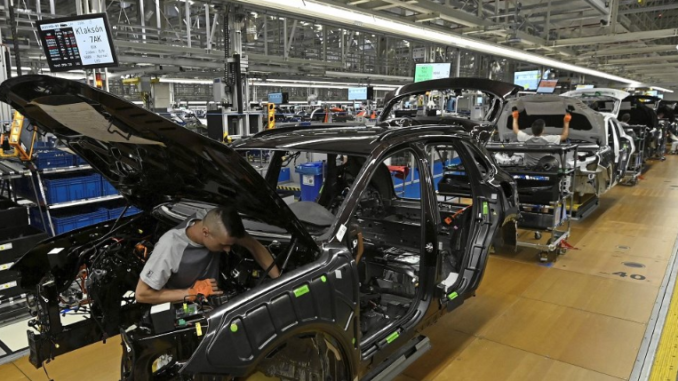
Warning light flashing for Slovakia’s auto industry while automakers thinking of locations for future production lines
When David landed an assembly line job at Volkswagen’s Bratislava factory, his colleagues congratulated him on securing a well-paid position he could ride to retirement. Two years later, he is among the 3,000 workers being laid off at the plantthat produces the Volkswagen Touareg and Porsche Cayenne in a round of job cuts that has sent shockwaves through Slovakia, the world’s biggest car producer per capita. The job losses at the factory, Slovakia’s largest private sector employer, underline the challenges the country faces to keep the engine revving in an industry that accounts forabout 12% of annual economic output and more than one in ten jobs.
Competition from lower-cost southeastern European markets, a shift to electric vehicles and global trade tensions are among the headwinds buffeting the small central European nation as automakers mull where to launch future production lines. Volkswagen itself is looking at building a new plant in eastern Europe, with trade publications citing Bulgaria, Serbia and Turkey as the most likely locations. “To use a car metaphor, we see a warning light, we don’t need to take the car for a general repair yet,” economy minister Peter Ziga said. “We have 300,000 people working in the car sector. Should anything happen to them it would be serious.”
The uncertainty has spurred unions, which have previously pushed for big wage increases, to change tack.
“At the moment, we do not focus on salaries, the priority is job stability,” Volkswagen union chief Zoroslav Smolinsky told Reuters. “We need to wait out the worse times and wait for the better times.”
Seeking to bolster an auto industry that accounts for 44% of industrial output and 40% of exports, the government has approved subsidies to boost the sale of electric cars and announced tax breaks of up to 200% of the amount invested in research and development. Slovakia is not the only central European country facing such challenges. Fellow EU members the Czech Republic, home to Volkswagen’s Skoda brand, and Hungary, where both BMW and Daimler have plants, rely heavily on investment from foreign automakers. “It has been taken for granted that plants like Bratislava would just carry on and produce the next generation model,” Carol Thomas, an auto analyst at LMC Automotive, said.
“But we can’t just assume that anymore. Plants will not only have to fight for new models, they will also face greater competition to retain new generations of models they already produce. This is the key year that will decide the future of the Slovak factory,” VW Slovak Chief Executive Oliver Grunberg said.
REUTERS
NAUČTE SE GRAMATIKU PODLE TEXTU
Dnes se zaměříme na výraz should použitý na začátku oznamovací věty: „Should anything happen to them… “ („Pokud se jim cokoliv stane…“). Výraz should v této větě nahrazuje výraz if a vyjadřuje možnost nějaké události v budoucnosti. Naše věta by tedy mohla znít: If anything happens to them… Pozor na sloveso použité po should; jedná se o infinitiv bez to a má ve všech osobách stejný tvar. S výrazem should na začátku oznamovací věty se však setkáme zřídka, vesměs se jedná o formální či literární styl.
Použijte should:
If you have any questions, contact me. If he needs anything else, let me know. If there are any more problems, inform me immediately.
Řešení: Should you have any questions, contact me. Should he need anything else, let me know. Should there be any more problems, inform me immediately.
SLOVÍČKA
warning light varovná kontrolka
land a job sehnat práci
assembly line montážní linka
retirement důchod
lay off propustit
plant podnik, závod, továrna
cut snížení, omezení
shockwave otřes, rozruch
rev zvýšit rychlost, otáčky
account for tvořit, podílet se
shift posun, změna
headwind protivítr
buffeting zmítání, otřesy
mull zvažovat
spur přimět, popohnat
union odborová organizace
wage increase zvyšování mezd
tack přístup, metoda
wait out přečkat
bolster podpořit, oživit
subsidy dotace
tax break daňové zvýhodnění
take for granted brát jako samozřejmost
assume předpokládat
retain udržet si, neztratit
Source LN
